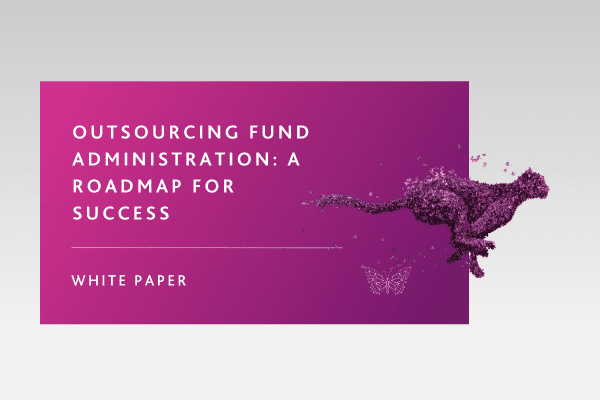Why Consider Outsourcing?
Whether or not to outsource administration of a fund is a big decision for managers, and it’s one that can spark lively debate.
However, in recent years, a growing number of managers have concluded that self-administration (i.e., doing everything in-house) is a misuse of precious internal resources. As a result, adoption of third-party administration continues to rise among funds of all sizes.
But the question remains: if you’re going move to a third-party fund administration solution, how do you do so securely and cost-effectively? If executed properly, it’s possible to outsource fund administration in a way that frees your bandwidth, boosts investor satisfaction, and actually lowers your operating expenses – but the steps needed to get there aren’t always obvious.
You can download the full white paper here or read online below:
Psychology of Outsourcing
To really understand the common resistance to outsourcing, it’s a good idea to take a step back and focus on the psychology behind it. Many of the reasons for outsourcing, in general, are influenced by individual decisions, and how the people who make these decisions are wired to make them.
Most successful fund managers have started from scratch and have built a track record over time by keeping control of their processes, of the people they hire, and of their selected investments. In an environment borne out of controls, it can be challenging to let go.
Control VS. Change
To relinquish control, embracing change management is therefore important. There has to be an overall consensus among internal stakeholders, as well as a clear understanding of the drivers that justify outsourcing, to make it work. The process needs to be supported by sufficient safeguards to reduce risk, both during the transition process and within the longer-term outsourcing arrangement.
Why now?
The key argument for outsourcing now is that fund management as an industry is getting more complicated. Everything from regulations and reporting requirements to fund structures is becoming more complex. That means fund administration is not only increasingly time-consuming, but it also requires ever more specialist expertise, most of which is not core to an asset manager’s mission and/or value proposition.
As a result, there is a growing trend to outsource fund administration to expert administrators. In fact, the Linedata Global Asset Management Survey 2023 reported that in North America 51% of asset management firms are outsourcing fund administration and accounting. Fund managers who don’t embrace fund admin may end up behind the curve of their peers.
Internal Drivers
The decision around outsourcing is usually motivated by several key internal drivers, and we believe it’s necessary to take a proactive — rather than reactive — approach to these issues. Letting internal inefficiencies linger puts unnecessary pressure on the manager, which distracts them from their core competencies.
Keeping up with Growth
The single biggest challenge, for many managers, is the resource challenge. How far can a fund grow with its in-house resources? There is a real risk of delaying the launch of new funds if resources are not available as needed – and adding resources in a pinch is difficult.
If you are assuming you will recognize the perfect time to outsource in your growth cycle, it may not be as obvious as you’d first expect.
In many cases, this occurs with the transition from private capital to more institutional investors. This shift typically brings along an increase in investor expectations (and an associated administrative burden). At this point, managers often begin to re-evaluate their internal operations.
There’s also a difference in approach between established managers and emerging managers. Established managers often take more of a gradual approach to outsourcing, choosing to structure the move around reporting cycles or new fund launches whereas emerging managers tend to decide on outsourcing much earlier, because they see this resource challenge on the horizon. In all cases, if the onboarding process is not carefully managed, it takes critical time away from the actual focus on their investment strategy so partnering with a vendor who appreciates urgency and brings structure to project management is paramount.
Back-Office Turnover
Back-office turnover is another internal driver. When people leave the firm, there is a real risk of losing institutional knowledge — and, of course, it seems to always happen at the wrong time. Therefore, many administrators have processes in place to safeguard continuity.
Protecting institutional knowledge also relies, increasingly, on technology. In fact, we’ve seen technological adoption act as a key differentiator over the last few years; managers who rely on self-administration tend to have less of a technology focus, and they were more likely to become stretched when faced with disruption. Meanwhile, those firms which had already outsourced their processes could lean on the support of their third-party administrator’s technology solutions.
The Changing Role of the CFO
The role of the traditional CFO has fundamentally changed as well. CFOs are now faced with a much larger set of responsibilities than in decades past. It’s becoming increasingly clear to funds of all sizes that a CFO’s time may not be best spent on internal administration which has increased adoption of third-party solutions.
External Drivers
LP Pressure/ Demands
Reporting
Investor expectations continue to expand, and institutional investors are generally more demanding than private investors. They want customized reports, at a moment’s notice — something seasoned third-party administrators are equipped to deliver.
Cost
A perennial driver on the LP side is the discussion around fees and margins. This encourages managers to look towards outsourcing as a means of cutting costs (or structuring costs more efficiently).
Competition for Capital
Obviously, among fund managers, there is significant competition to attract capital. Back-office excellence, achieved through outsourcing, can actually differentiate funds in this regard — a majority of institutional investors want to see a third-party administrator in charge of the fund accounting.
When a fund begins to attract the attention of institutional investors, it’s certainly time to outsource. For these investors, a lack of third-party administration can easily be a deal-breaker during the due diligence processes, whereas outsourcing signals to investors that the GP embraces the highest levels of security, transparency, and compliance.
Increased Regulations
Fund managers must continually adapt to new reporting standards. Changing reporting requirements have significantly increased back-office workloads, and this is doubly true when dealing with institutional investors. Increased regulation demands increased expertise.
Regulatory complexity has had a big impact on outsourcing, and the complexity only increases as funds reach beyond their home countries. (This complexity also has a direct effect on the cost of compliance.) The regulatory landscape continues to evolve in a direction that suggests a more complex reporting regime, e.g. New Private Fund Rules.
Growing AUM
Increasing AUM creates a need for firms to scale, and this demands ever-greater efficiency. Simply put, outsourcing can reduce the number of people performing jobs that don’t drive returns.
Ancillary Reporting
As the modern investor profile evolves, accountability in ESG (environmental, social and governance) metrics and other non-traditional reporting are becoming increasingly important.
Investors care more than ever about the social and environmental impact of their investments, for example, as well as the governance structures of the companies in which they invest. They want to know that their capital is being put to work responsibly, and this has driven additional reporting needs.
According to research conducted by another market data provider, investors perceive many challenges to sustainable investing. The leading concern for all respondent types was the lack of clarity in how to define and measure impact outcomes. A lack of robust data on ESG factors for funds came in second.
By partnering with a third-party administrator that provides dedicated tools to track and report ESG metrics, fund managers may be able to win market share within the growing pool of impact-focused investors.
How to Efficiently Outsource
Make the Decision
It starts by getting internal consensus, and it continues with change management. You have to have clear buy-in from stakeholders. You need to prepare your teams, and you also really need to understand their needs. This includes taking inventory of the tasks that need outsourcing and the tasks which do not.
Do your due diligence
Do your due diligence – focus on the processes, the available expertise, and the technology the administrator uses. It’s important to look for a true, trusted and long-term partner that really brings value (and is able to display that during the selection process).
In today’s increasingly remote work environment, you want a partner that is reliable, consistent, approachable, and empathetic.
Find a Partner Who Listens
Communication is key to effective administration. Don’t hesitate to voice your needs and concerns — if you don’t speak up, you’re more likely to get generic answers and solutions. Look at the corporate culture of your administrator — do they share your organizational values? And again, most importantly, does this administrator have the ability to support your growth, whether it’s operational or geographical?
Choose a Partner Who Can Support Growth
Ensure your administrator is able to support your growth, so that when the time comes for you to start exploring new markets, you have an administrator that will enable this through their expertise, operational ability and geographical locations.
Benefits of Outsourcing
To summarize, what are the benefits of outsourcing?
- REDUCING RISK is one of the biggest benefits of outsourcing, whether it relates to people, processes or regulatory compliance. A successful outsourcing arrangement will provide safeguards to mitigate risk.
- SYSTEMS: Investors are demanding more transparency, and many want to know which systems are being used. Spreadsheets are no longer sufficient; specialized accounting systems have become truly essential in our industry. But specialized systems can be very expensive — not only due to vendor cost, but also to support, maintenance and training. The cost can easily outweigh the benefit of buying the administration technology yourself. However, administrators are able to handle these technology platforms at scale. It is best to find an administrator that doesn’t use off-the-shelf technology, but one which has developed its own purpose-built solutions.
- PEOPLE: Some work is cyclical, so it is difficult to staff during peak demand periods. And given staff turnover, you are continually training people. Third-party administration can offer overflow resources when your in-house staff is under too much pressure.
- COST: Outsourced solutions are often regarded as expensive; however, when you compare the cost vs. doing the work in-house, some cost factors are frequently a) underestimated or b) not even taken into account. For instance, your working environment, office space, infrastructure, IT, human resources, recruitment, training, management time… it all adds to the cost of self-administration. Further, whether these are classed as fund expenses or management company expenses is highly relevant, especially in a time when limited partners are putting pressure on margins and fees.
- INDEPENDENCE: Fund returns are based on calculations of IRR. To some LPs, they place value in better optics that come with independence fee calculation. Having an administrator perform these calculations provides investors with an assurance that there is no undue influence.
- SPECIALIZATION: Highest ROI for GPs lie in doing deals, raising capital and making prudent investments…not necessarily in overseeing accounting or administration functions. Working with a fund administrator gives you access to people who have specialized expertise in the space.
- STABILITY: As you grow, you are going to launch new funds. By working with an administrator, you don’t need to worry about scaling your back-office. Linedata Global Asset Management Survey 2023. Published by Linedata, 07 June 2023.
Key contact
Stay Connected
Stay up to date with expert insights, latest updates and exclusive content.
Discover more
Stay informed with JTC’s latest news, reports, thought leadership, and industry insights.
Let’s Bring Your Vision to Life
From 2,300 employee owners to 14,000+ clients, our journey is marked by stability and success.





















